日常交际英语学习资料总结介绍终审稿)
日常口语知识点总结
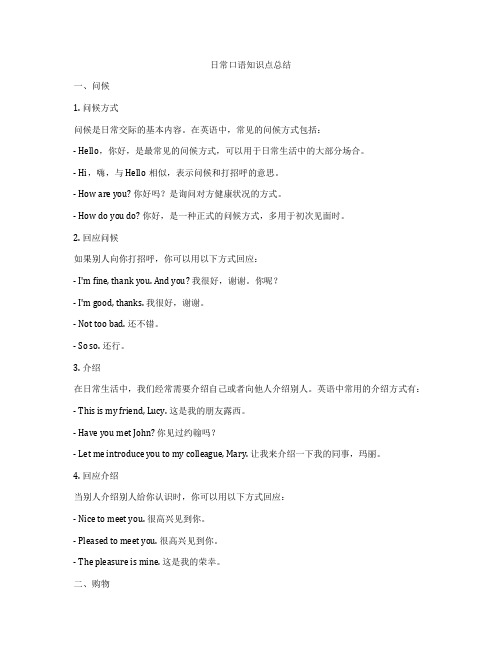
日常口语知识点总结一、问候1. 问候方式问候是日常交际的基本内容。
在英语中,常见的问候方式包括:- Hello,你好,是最常见的问候方式,可以用于日常生活中的大部分场合。
- Hi,嗨,与Hello相似,表示问候和打招呼的意思。
- How are you? 你好吗?是询问对方健康状况的方式。
- How do you do? 你好,是一种正式的问候方式,多用于初次见面时。
2. 回应问候如果别人向你打招呼,你可以用以下方式回应:- I'm fine, thank you. And you? 我很好,谢谢。
你呢?- I'm good, thanks. 我很好,谢谢。
- Not too bad. 还不错。
- So so. 还行。
3. 介绍在日常生活中,我们经常需要介绍自己或者向他人介绍别人。
英语中常用的介绍方式有:- This is my friend, Lucy. 这是我的朋友露西。
- Have you met John? 你见过约翰吗?- Let me introduce you to my colleague, Mary. 让我来介绍一下我的同事,玛丽。
4. 回应介绍当别人介绍别人给你认识时,你可以用以下方式回应:- Nice to meet you. 很高兴见到你。
- Pleased to meet you. 很高兴见到你。
- The pleasure is mine. 这是我的荣幸。
二、购物1. 问价格购物时,我们常常需要询问商品价格。
在英语中,可以用以下方式来询问:- How much is this? 这个多少钱?- What's the price of this? 这个多少钱?- How much does it cost? 它要多少钱?2. 讨价还价在购物时,讨价还价是一个常见的行为。
以下是一些在讨价还价时可以使用的句子:- Can you give me a discount? 你能给我打个折吗?- Is there any room for negotiation? 这个还有谈价的余地吗?- I think it's a bit expensive. Can you lower the price? 我觉得有点贵,你能降价吗?3. 支付方式在购物时,我们常常需要问及支付方式。
日常英语知识点总结
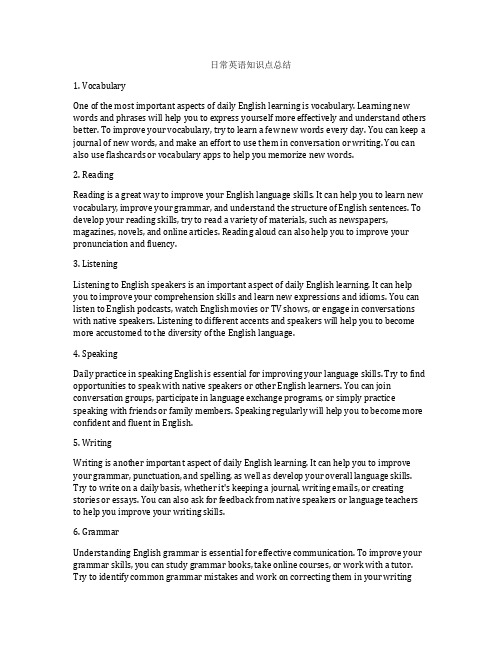
日常英语知识点总结1. VocabularyOne of the most important aspects of daily English learning is vocabulary. Learning new words and phrases will help you to express yourself more effectively and understand others better. To improve your vocabulary, try to learn a few new words every day. You can keep a journal of new words, and make an effort to use them in conversation or writing. You can also use flashcards or vocabulary apps to help you memorize new words.2. ReadingReading is a great way to improve your English language skills. It can help you to learn new vocabulary, improve your grammar, and understand the structure of English sentences. To develop your reading skills, try to read a variety of materials, such as newspapers, magazines, novels, and online articles. Reading aloud can also help you to improve your pronunciation and fluency.3. ListeningListening to English speakers is an important aspect of daily English learning. It can help you to improve your comprehension skills and learn new expressions and idioms. You can listen to English podcasts, watch English movies or TV shows, or engage in conversations with native speakers. Listening to different accents and speakers will help you to become more accustomed to the diversity of the English language.4. SpeakingDaily practice in speaking English is essential for improving your language skills. Try to find opportunities to speak with native speakers or other English learners. You can join conversation groups, participate in language exchange programs, or simply practice speaking with friends or family members. Speaking regularly will help you to become more confident and fluent in English.5. WritingWriting is another important aspect of daily English learning. It can help you to improve your grammar, punctuation, and spelling, as well as develop your overall language skills. Try to write on a daily basis, whether it's keeping a journal, writing emails, or creating stories or essays. You can also ask for feedback from native speakers or language teachers to help you improve your writing skills.6. GrammarUnderstanding English grammar is essential for effective communication. To improve your grammar skills, you can study grammar books, take online courses, or work with a tutor. Try to identify common grammar mistakes and work on correcting them in your writingand speaking. Practice using different tenses, verb forms, and sentence structures to become more proficient in English grammar.7. Idioms and expressionsLearning idioms and expressions can help you to sound more natural and fluent in English. Idioms are phrases with meanings that are different from the literal meanings of the individual words. Expressions are commonly used phrases that native speakers use in everyday conversation. Try to learn and use idioms and expressions in your speaking and writing to sound more like a native speaker.8. PronunciationImproving your pronunciation is important for effective communication in English. Try to listen carefully to how native speakers pronounce words and practice speaking with the correct intonation and stress. You can also use pronunciation apps or online resources to help you improve your pronunciation skills.9. Cultural understandingHaving a basic understanding of English-speaking cultures can help you to communicate more effectively in English. Try to learn about the customs, traditions, and social norms of English-speaking countries. This will help you to better understand the context and meaning of conversations with native speakers.10. Practice, practice, practiceThe key to daily English learning is practice. Try to incorporate English into your daily routine as much as possible. Set aside time for reading, writing, listening, and speaking in English every day. The more you practice, the more confident and proficient you will become in English.In conclusion, daily English learning is essential for improving your language skills and becoming more fluent in English. By focusing on vocabulary, reading, listening, speaking, writing, grammar, idioms, pronunciation, cultural understanding, and regular practice, you can make significant progress in your English language abilities. Keep in mind that consistent effort and dedication will help you to achieve your language learning goals.。
日常交际英语学习资料总结介绍
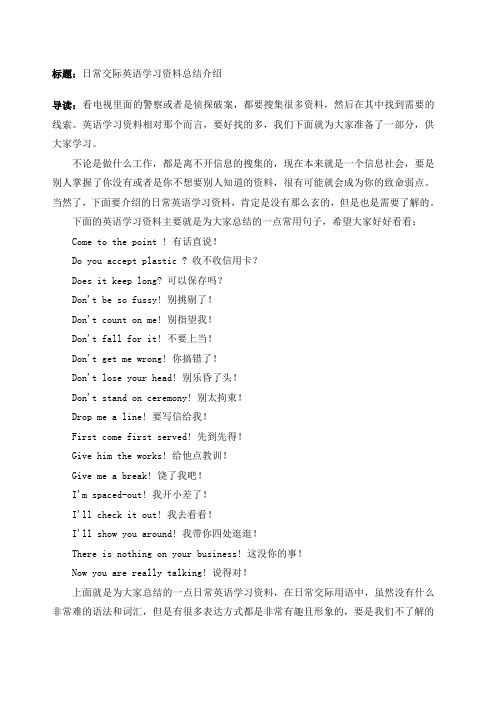
标题:日常交际英语学习资料总结介绍导读:看电视里面的警察或者是侦探破案,都要搜集很多资料,然后在其中找到需要的线索。
英语学习资料相对那个而言,要好找的多,我们下面就为大家准备了一部分,供大家学习。
不论是做什么工作,都是离不开信息的搜集的,现在本来就是一个信息社会,要是别人掌握了你没有或者是你不想要别人知道的资料,很有可能就会成为你的致命弱点。
当然了,下面要介绍的日常英语学习资料,肯定是没有那么玄的,但是也是需要了解的。
下面的英语学习资料主要就是为大家总结的一点常用句子,希望大家好好看看:Come to the point ! 有话直说!Do you accept plastic ? 收不收信用卡?Does it keep long? 可以保存吗?Don't be so fussy! 别挑剔了!Don't count on me! 别指望我!Don't fall for it! 不要上当!Don't get me wrong! 你搞错了!Don't lose your head! 别乐昏了头!Don't stand on ceremony! 别太拘束!Drop me a line! 要写信给我!First come first served! 先到先得!Give him the works! 给他点教训!Give me a break! 饶了我吧!I'm spaced-out! 我开小差了!I'll check it out! 我去看看!I'll show you around! 我带你四处逛逛!There is nothing on your business! 这没你的事!Now you are really talking! 说得对!上面就是为大家总结的一点日常英语学习资料,在日常交际用语中,虽然没有什么非常难的语法和词汇,但是有很多表达方式都是非常有趣且形象的,要是我们不了解的话,说不定会产生误解,所以还是希望大家能够多掌握一些类似的句子。
英语交际用语知识点总结
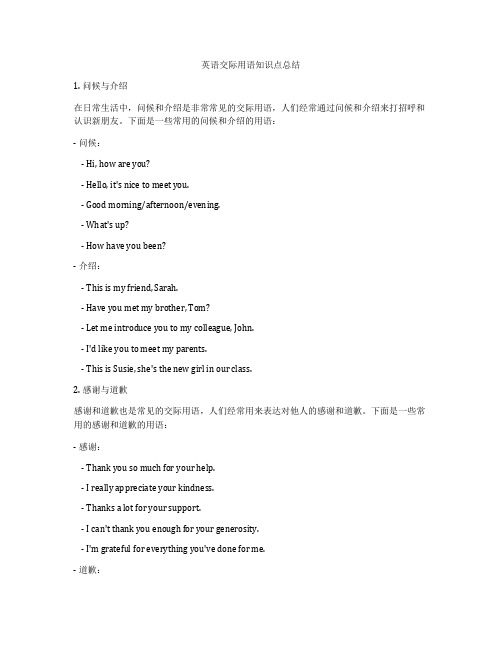
英语交际用语知识点总结1. 问候与介绍在日常生活中,问候和介绍是非常常见的交际用语,人们经常通过问候和介绍来打招呼和认识新朋友。
下面是一些常用的问候和介绍的用语:- 问候:- Hi, how are you?- Hello, it's nice to meet you.- Good morning/afternoon/evening.- What's up?- How have you been?- 介绍:- This is my friend, Sarah.- Have you met my brother, Tom?- Let me introduce you to my colleague, John.- I'd like you to meet my parents.- This is Susie, she's the new girl in our class.2. 感谢与道歉感谢和道歉也是常见的交际用语,人们经常用来表达对他人的感谢和道歉。
下面是一些常用的感谢和道歉的用语:- 感谢:- Thank you so much for your help.- I really appreciate your kindness.- Thanks a lot for your support.- I can't thank you enough for your generosity.- I'm grateful for everything you've done for me.- 道歉:- I'm sorry for being late.- Please forgive me for my mistake.- I apologize for any inconvenience I may have caused.- I'm really sorry for what I said earlier.- It was my fault, I'm truly sorry.3. 请求与邀请当需要请求帮助或邀请他人一起做某事时,人们会使用请求和邀请的交际用语。
酒店前台日常实用英语口语很全(终审稿)

酒店前台日常实用英语口语很全文稿归稿存档编号:[KKUY-KKIO69-OTM243-OLUI129-G00I-FDQS58-酒店前台英语口语一.概述在酒店里所使用的英语会话,基本上是属于商业英语,与日常生活会话中所使用的英语略有不同,较注重礼节。
正式英语通常会让人误解为极艰深的英语,其实,只要套用一定格式的句子和单词,就可以了。
例如:非正式英语正式英语What’s your name May I have your name您贵姓请问您贵姓大名Do you want some tea Could you like some tea您要喝茶吗请问您想喝茶吗Over here, please. Could you come this way please?这边请。
请您往这边走好吗* 不要说OK, Sure, Yeah等等,而要说Certainly, Sir.* Hey, uh-huh, Hang on 等等,也不适合在酒店中使用。
* 别说“I don’t know.”回答“不知道”是非常不礼貌的说法。
可以说“just a moment, please. I’ll check that for you.” (请稍候,我来帮您确认),然后请有能力处理的人前来协助。
* 对男性客人,尊称为Sir; 面对女性客人时尊称为Ms.在招呼客人时,最好说“Excuse me, Sir(Ms)”, 不要直接称呼Mr.或Ms. 至于称呼小孩,可以直接使用Excuse me,但是不可以直接称呼boy或girl.* 正视对方的眼睛,以显示出你的信心和诚意。
但必须注意,注视对方的眼睛,并不是无理地盯着对方看。
* 在面对语言不通的外籍人士时,一定要多加利用手势和肢体语言。
但是使用手势时要特别小心,因为对于不同国家、民族而言,手势的意义也大不相同。
二.基本待客英语(一)在正式的英语表现里,疑问基本句型可分为下列四种:1. May I ~2. Could you ~3. Would you ~4.Shall I ~?只要理解这四种基本的句型,就可以处理大部分业务上的状况。
初中英语口语应用知识点总结
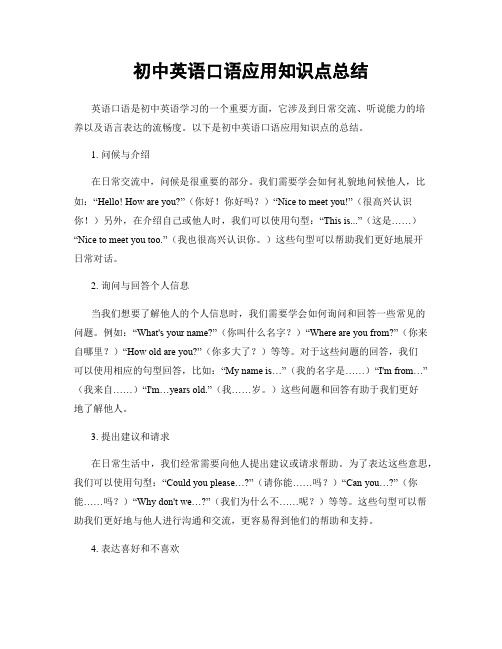
初中英语口语应用知识点总结英语口语是初中英语学习的一个重要方面,它涉及到日常交流、听说能力的培养以及语言表达的流畅度。
以下是初中英语口语应用知识点的总结。
1. 问候与介绍在日常交流中,问候是很重要的部分。
我们需要学会如何礼貌地问候他人,比如:“Hello! How are you?”(你好!你好吗?)“Nice to meet you!”(很高兴认识你!)另外,在介绍自己或他人时,我们可以使用句型:“This is...”(这是……)“Nice to meet you too.”(我也很高兴认识你。
)这些句型可以帮助我们更好地展开日常对话。
2. 询问与回答个人信息当我们想要了解他人的个人信息时,我们需要学会如何询问和回答一些常见的问题。
例如:“What's your name?”(你叫什么名字?)“Where are you from?”(你来自哪里?)“How old are you?”(你多大了?)等等。
对于这些问题的回答,我们可以使用相应的句型回答,比如:“My name is…”(我的名字是……)“I'm from…”(我来自……)“I'm…years old.”(我……岁。
)这些问题和回答有助于我们更好地了解他人。
3. 提出建议和请求在日常生活中,我们经常需要向他人提出建议或请求帮助。
为了表达这些意思,我们可以使用句型:“Could you please…?”(请你能……吗?)“Can you…?”(你能……吗?)“Why don't we…?”(我们为什么不……呢?)等等。
这些句型可以帮助我们更好地与他人进行沟通和交流,更容易得到他们的帮助和支持。
4. 表达喜好和不喜欢当我们想要表达自己的喜好或不喜欢时,我们可以使用一些常用的句型。
例如:“I like…(我喜欢……)”“I love…(我爱……)”“I don't like…(我不喜欢……)”等等。
小学英语语法总结大全(终审稿)

小学英语语法总结大全公司内部档案编码:[OPPTR-OPPT28-OPPTL98-OPPNN08]小学英语语法大全第一章名词一、定义名词是表示人或事物名称的词。
它既可以表示具体的东西,也可以是表示抽象的东西。
二、分类1.名词可以根据意义分为普通名词和专有名词如:johnisastudentstudent是普通名词,john是专有名词普通名词前可以用不定冠词a/an,定冠词the或不加冠词,专有名词前一般不加冠词,专有名词的首字母要大写。
2.普通名词又可以分为个体名词、集体名词、物质名词和抽象名词,其中个体名词与集体名词是可数名词,物质名词和抽象名称是不可数名词。
3.专有名词专有名词是表示人名、地名、团体、机构、组织等的专有名词,多为独一无二的事物。
三、名词的数1、名词分为可数名词和不可数名词。
可数名词——可以数的名词不可数名词——数不清(没有复数)drinkmilkteawaterorangejuicecokecoffeeporridge foodricebreadmeatfishfruitcakedumplings2、可数名词与不定冠词a(an)连用有数数形式,不可数名词不能与不定冠词a(an)连用,没有复数形式many+可数名词复数much/alittle+不可数名词some,any,alotof(lotsof)两者都可以修饰。
3、可数名词可以直接用数词来修饰不可数名词数词+量词+of+名词对可数名词的数量提问用howmany对不可数名词的数量提问用howmuch4、不可数名词的量有以下两种表示方法:1)some,much,alittle,alotof,abitof,plentyof用等表示多少。
注意既可以与可数名词复数,又可以与不可数名词连用的有:plentyof,some,alotof,lotsof,mostof等。
如thereismuchwaterinthebottle.瓶中有很多水。
日常交际英语专业作文模板
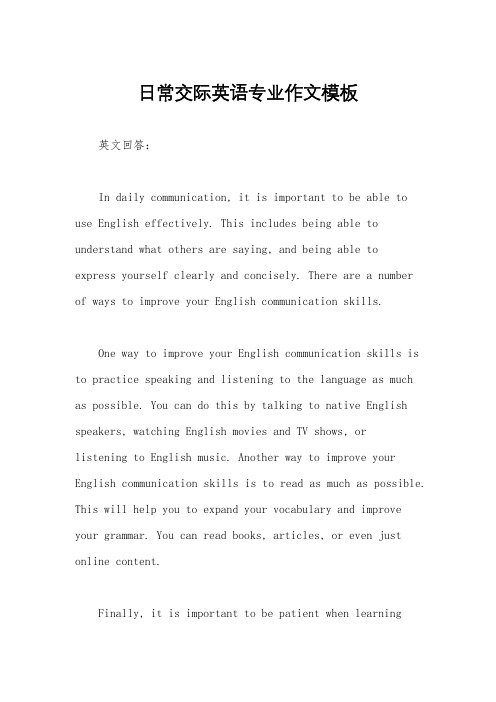
日常交际英语专业作文模板英文回答:In daily communication, it is important to be able to use English effectively. This includes being able to understand what others are saying, and being able toexpress yourself clearly and concisely. There are a numberof ways to improve your English communication skills.One way to improve your English communication skills is to practice speaking and listening to the language as much as possible. You can do this by talking to native English speakers, watching English movies and TV shows, orlistening to English music. Another way to improve your English communication skills is to read as much as possible. This will help you to expand your vocabulary and improve your grammar. You can read books, articles, or even just online content.Finally, it is important to be patient when learningEnglish. It takes time and effort to master a new language. However, with regular practice, you will be able to improve your English communication skills and use the language effectively in everyday situations.中文回答:在日常交际中,能够有效地运用英语非常重要。
- 1、下载文档前请自行甄别文档内容的完整性,平台不提供额外的编辑、内容补充、找答案等附加服务。
- 2、"仅部分预览"的文档,不可在线预览部分如存在完整性等问题,可反馈申请退款(可完整预览的文档不适用该条件!)。
- 3、如文档侵犯您的权益,请联系客服反馈,我们会尽快为您处理(人工客服工作时间:9:00-18:30)。
日常交际英语学习资料
总结介绍
文稿归稿存档编号:[KKUY-KKIO69-OTM243-OLUI129-G00I-FDQS58-
标题:日常交际英语学习资料总结介绍
导读:看电视里面的警察或者是侦探破案,都要搜集很多资料,然后在其中找到需要的线索。
英语学习资料相对那个而言,要好找的多,我们下面就为大家准备了一部分,供大家学习。
不论是做什么工作,都是离不开信息的搜集的,现在本来就是一个信息社会,要是别人掌握了你没有或者是你不想要别人知道的资料,很有可能就会成为你的致命弱点。
当然了,下面要介绍的日常英语学习资料,肯定是没有那么玄的,但是也是需要了解的。
下面的英语学习资料主要就是为大家总结的一点常用句子,希望大家好好看看:
Come to the point ! 有话直说!
Do you accept plastic 收不收信用卡
Does it keep long 可以保存吗
Don't be so fussy! 别挑剔了!
Don't count on me! 别指望我!
Don't fall for it! 不要上当!
Don't get me wrong! 你搞错了!
Don't lose your head! 别乐昏了头!
Don't stand on ceremony! 别太拘束!
Drop me a line! 要写信给我!
First come first served! 先到先得!
Give him the works! 给他点教训!
Give me a break! 饶了我吧!
I'm spaced-out! 我开小差了!
I'll check it out! 我去看看!
I'll show you around! 我带你四处逛逛!
There is nothing on your business! 这没你的事!
Now you are really talking! 说得对!
上面就是为大家总结的一点日常英语学习资料,在日常交际用语中,虽然没有什么非常难的语法和词汇,但是有很多表达方式都是非常有趣且形象的,要是我们不了解的话,说不定会产生误解,所以还是希望大家能够多掌握一些类似的句子。
更多学习资料请见美联英语学习网。
